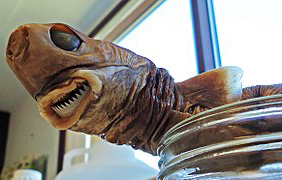Cookiecutter Shark

Common Name: Cookiecutter Shark
Scientific Name: Isistius brasiliensis
DESCRIPTION
The cookiecutter shark, also called as cigar shark, is a species of small dogfish shark and it is based on the family called Dalatiidae. This shark occurs in warm oceanic waters particularly near islands, and it has been recorded deep as 3.7 km.
DIET
The sharks attached to the prey using its strong, sucking lips, and then the efficient teeth go to work, almost like a can-opener. Targets include larger fishes such as marlin, tuna, other sharks and stingrays, and marine mammals including seals and whales. The diet can also include whole squid and crustaceans.
BEHAVIOUR
The cookiecutter shark spins its body to remove a "cookie-shaped" plug of flesh that swallows before releasing its prey. Unlike other shark species that loses teeth individually, the teeth of the cookiecutter shark are outhouse as a single unit.
HABITAT
The cookiecutter shark has a wide range of pelagic shark that lives in the temperate and tropical waters of the Atlantic and Pacific Oceans around the globe.
SPECIAL FEATURES OR HABITS
Cookiecutter shark has a slim body, cone-shaped muzzle and has a circular mouth fitted with sharp teeth. It has a large triangular-shaped teeth in the lower jaw. Its upper jaw is covered with small bent teeth.
LOCATION OR REGION FOUND
Cookiecutter shark occurs in warm oceanic waters particularly near islands, and it has been recorded deep as 3.7 km.
 Deep Sea Crabs
Deep Sea Crabs